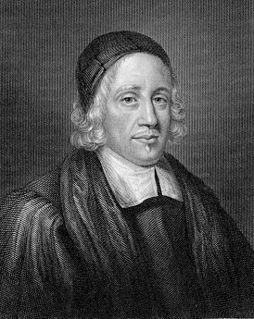
Edmund Calamy was an English Presbyterian church leader and divine. Known as "the elder", he was the first of four generations of nonconformist ministers bearing the same name.

John Lightfoot was an English churchman, rabbinical scholar, Vice-Chancellor of the University of Cambridge and Master of St Catharine's College, Cambridge.

John Goodwin (1594–1665) was an English preacher, theologian and prolific author of significant books.

Philip Henry was an English Nonconformist clergyman and diarist. His son Matthew Henry was a notable commentator on the Bible and also a Presbyterian minister.
Charles Herle (1598–1659) was a prominent English theologian, of moderate Presbyterian views.
Anthony Burges or Burgess was a Nonconformist English clergyman, a prolific preacher and writer.

Sidrach Simpson (c.1600-1655) was an English Independent minister, one of the leaders of the Independent faction in the Westminster Assembly.
Lazarus Seaman, was an English clergyman, supporter in the Westminster Assembly of the Presbyterian party, intruded Master of Peterhouse, Cambridge, and nonconformist minister.
John Bond LL.D. (1612–1676) was an English jurist, Puritan clergyman, member of the Westminster Assembly, and Master of Trinity Hall, Cambridge.
Christopher Feake (1612–1683) was an English Independent minister and Fifth-monarchy man. He was imprisoned for maligning Oliver Cromwell in his preaching. He is a leading example of someone sharing both Leveller views and the millenarian approach of the Fifth Monarchists. His violence was exclusively verbal, but he wrote against the Quakers.

(Thomas Case was also an Oxford professor of philosophy.)
John Tombes was an English clergyman of Presbyterian and Baptist views.
Thomas Gilbert (1613–1694) was an English ejected minister of the seventeenth century.
John Downame (Downham) (1571–1652) was an English Puritan clergyman and theologian in London, who came to prominence in the 1640s, when he worked closely with the Westminster Assembly. He is now remembered for his writings.

Obadiah Sedgwick (1600?–1658) was an English clergyman of presbyterian views, and a member of the Westminster Assembly.
John Ley was an English clergyman and member of the Westminster Assembly.
Richard Byfield (1598?–1664) was an English clergyman, Sabbatarian controversialist, member of the Westminster Assembly, and ejected minister.

William Greenhill (1591–1671) was an English nonconformist clergyman, independent minister, and member of the Westminster Assembly.
Nathaniel Hardy (1618–1670) was an English churchman, Dean of Rochester from 1660.
Edward Reyner (Rayner) (1600–c.1668) was an English nonconforming clergyman, known as a devotional writer.








